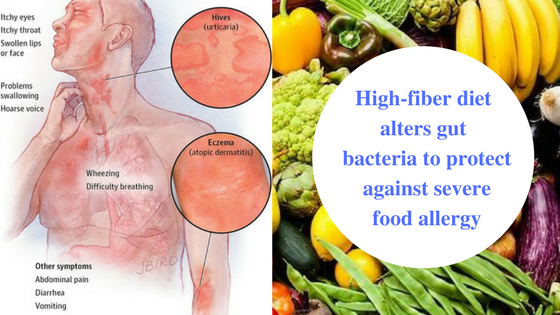High-fiber
diet alters gut bacteria to protect against severe food allergy
A food allergy is one type of
abnormal immune response and the signs and symptoms may range from mild to
severe. The gut bacteria may be altered by a high-fiber diet rich in vitamin A.
That could help to prevent or reverse food allergies. This is the current prime focus
of research in medicinal research.
The number of food allergy patients
increasing day by day, also it is estimated that in the United States around 15
million people have food allergy. Allergies occur when immunoglobulin E
(IgE) that is a part of the body’s immune system, binds to food molecules. Allergic
reactions to food vary from one person to other person, but the symptoms may
include tingling or itching in the mouth, hives, nausea or vomiting, stomach
pain, and diarrhoea.
In more severe or
emergency food allergy cases, a person suffering from food allergy may experience swelling of the
lips, swelling of the tongue, and/or throat, shortness of breath, trouble
swallowing, chest pain, and a sudden drop in blood pressure. Occurrence of
severe symptoms - alone or alongside milder ones - could be indicators of
anaphylaxis, a potentially life-threatening reaction that requires immediate
medical attention. Obviously, the most ideal approach to keep away from allergic
reaction to nourishment is to avoid consuming the food that triggers it, though
this can be easier or simpler said than done. Presently, another investigation suggests
there might be a simple way to prevent or reverse food allergies: a high-fiber
diet, enriched with vitamin A.
The diagnosis of food
allergy is usually based on a medical history, elimination diet, skin prick
test, blood tests for food-specific IgE antibodies, or oral food challenge. Event
of extreme side effects - nearby milder ones - could be markers of
hypersensitivity, a possibly perilous response that requires prompt therapeutic
consideration.




Comments
Post a Comment